By 2025, literature reviews will be quicker and more effective due to AI tools for literature review. These tools assist researchers, academics, and students with tasks like managing citations, finding studies, and summarizing papers.
Choose a tool according to your research needs; each has its own advantages. Try Scholarcy or ChatPDF for brief summaries. Use Iris.ai or Research Rabbit to find connections. Do you require summaries based on evidence? Choose Consensus.
To avoid AI detection, use Undetectable AI. It can do it in a single click.
Table of Contents
Best AI Tools for Literature Review
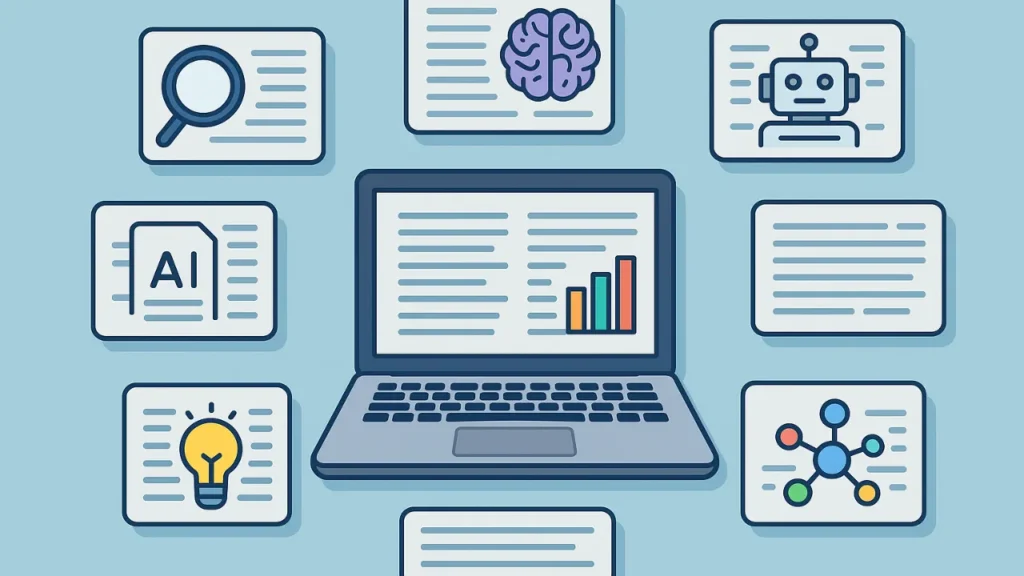
Sourcely
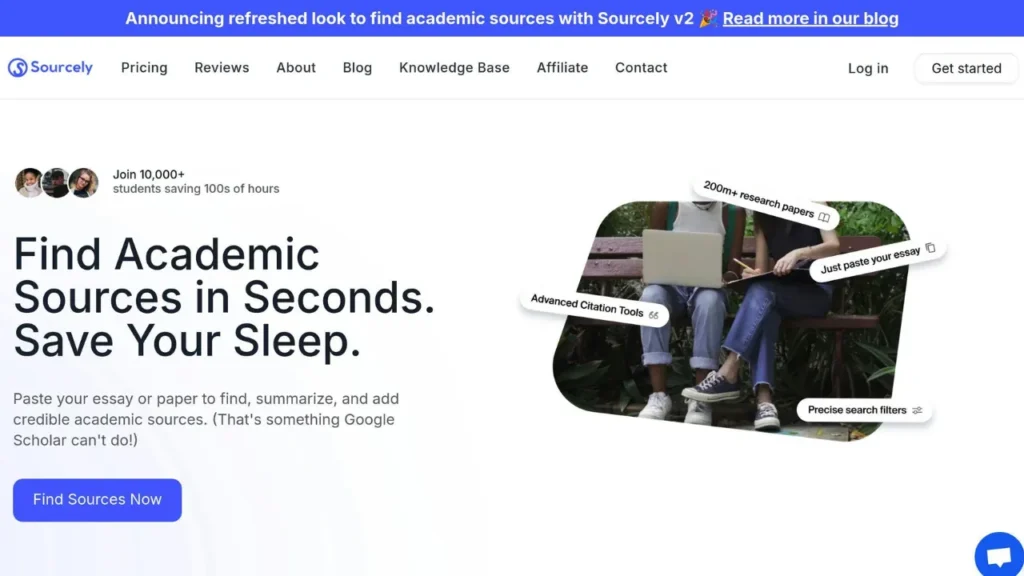
Sourcely addresses the difficulties researchers encounter when conducting literature reviews by combining sophisticated search tools, smart organization features, and automated summarization. The context-aware search feature of Sourcely extends beyond simple keyword matching.
Its AI comprehends the purpose of your research and assists you in finding studies that might otherwise go unnoticed. By using filters like publication date, author credentials, and research methods, you can sift through millions of scholarly sources and identify the most important ones.
With Sourcely, citations are a breeze. As you compile sources, the platform automatically creates citations in a variety of formats. When compared to manual efforts, this automation increases citation accuracy by 25%.
With its personalized collections and astute suggestions that point out any gaps in your literature review, Sourcely keeps you organized. Your initial review time is reduced by 30 percent due to its AI-powered summarization tool, which distills lengthy papers into their essential points.
Additionally, it gives you a streamlined workspace for all of your research needs by integrating with citation tools and major academic databases.
Consensus
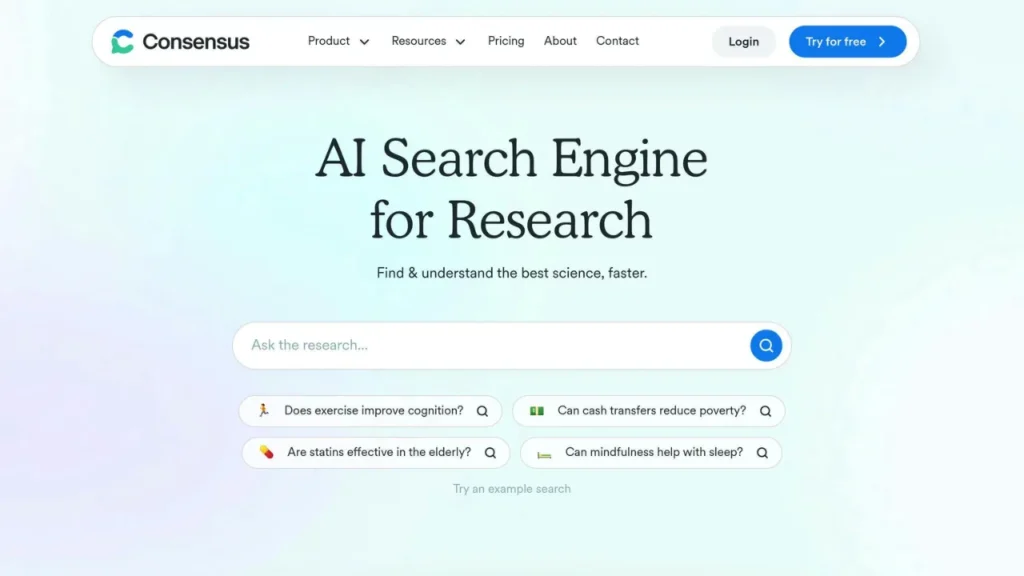
Consensus is a search engine driven by artificial intelligence that offers evidence-based solutions in six academic domains: medicine, social policy, economics, sleep, mental health, and health supplements. Consensus uses sophisticated algorithms that go beyond basic keyword searches.
It provides straightforward, fact-based responses to particular queries by comprehending the background and specifics of scholarly research. This method saves time by rapidly locating important papers that are pertinent to your question.
Consensus supports several citation styles, including APA, MLA, and Chicago, and integrates easily with well-known reference management systems. Citations are automatically generated and formatted, which lowers errors and guarantees accuracy throughout your research.
Read Also >>> AI for Statistics in 2025
The platform allows users to add custom notes, tracks the reliability of the evidence, links related studies, and classifies sources according to themes. Researchers can identify trends and maintain control over their literature review process with the aid of this structure.
Consensus employs AI to distill intricate scholarly articles into their main conclusions and approaches. While maintaining crucial insights from the original studies, researchers report completing literature reviews 30% faster.
Research Rabbit
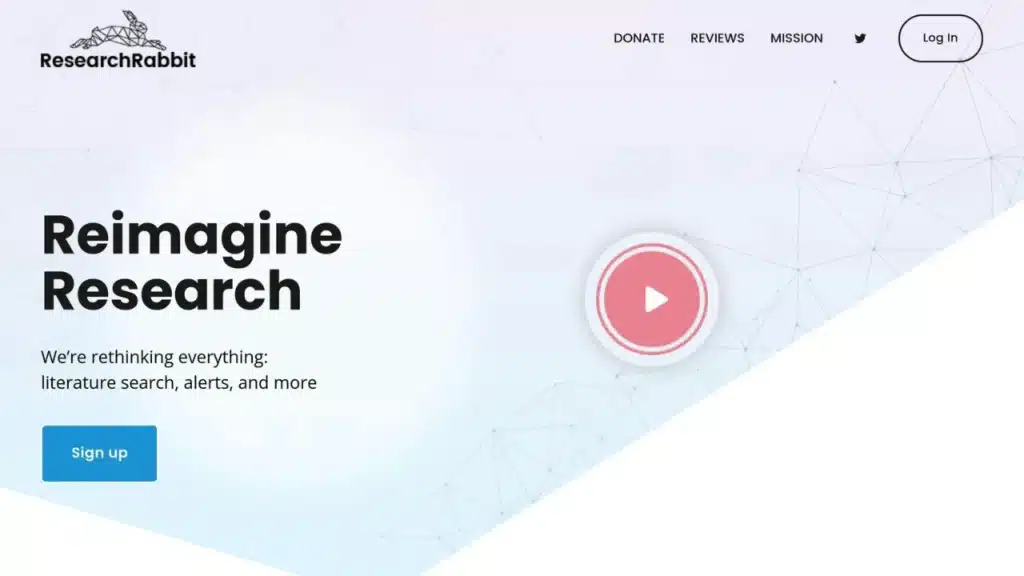
Research Rabbit is a tool driven by artificial intelligence that aims to revolutionize the way scholars locate and arrange scholarly literature. A new method for investigating and comprehending research connections is provided by its network-based methodology.
Advanced AI is used by Research Rabbit to adjust to your research interests. It finds connections between scholarly works and offers personalized recommendations that conventional search techniques frequently miss. By visualizing co-authorship networks and citation relationships, this tool goes beyond basic citation management.
It is simpler to track the impact of important studies and comprehend their scholarly significance due to these visual maps. Research Rabbit visually maps the relationships between studies and authors and groups scholarly articles into thematic collections.
Additionally, it monitors co-authorship trends, assisting users in identifying top scholars or teams within their field. Despite not summarizing specific papers, Research Rabbit’s network visualizations offer an in-depth overview of various research topics.
This facilitates the literature review process by enabling users to identify important studies and trends more rapidly.
Update your collections frequently and explore different research topics using Research Rabbit’s visual tools to get the most out of the platform. By emphasizing the connections among studies, it provides an alternative viewpoint to conventional review techniques.
ChatPDF
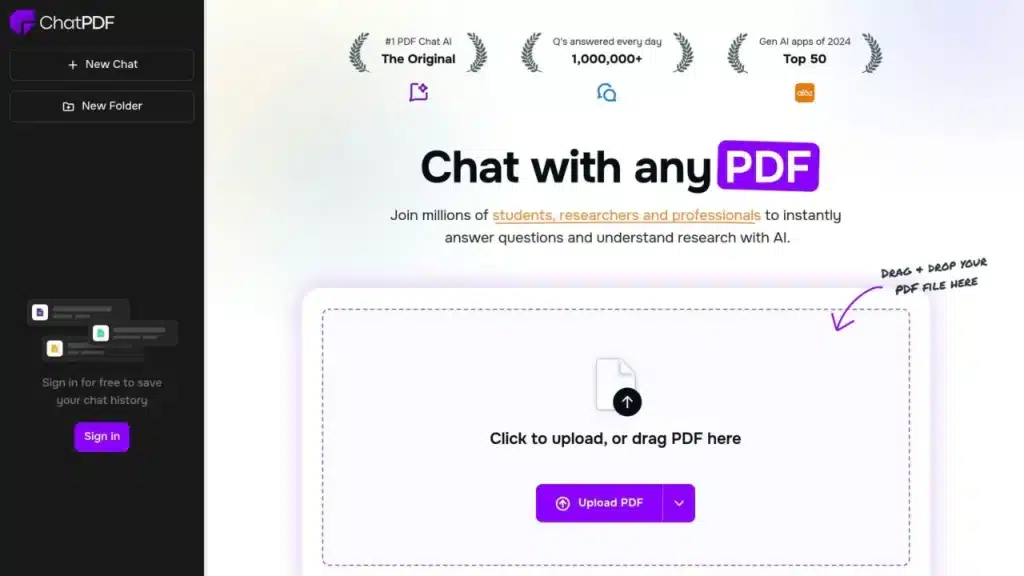
By introducing an AI-driven conversational tool for document analysis, ChatPDF transforms the way researchers interact with academic papers by making it easier to extract and comprehend information from dense scholarly articles.
Researchers can ask questions in plain language and receive prompt, accurate answers directly from the document, allowing them to locate specific details within complex academic texts.
However, ChatPDF lacks built-in citation management, so users frequently combine it with other citation tools to create a comprehensive research workflow. Instead of managing a collection of sources, ChatPDF concentrates on working with individual documents.
Researchers frequently use programs like Research Rabbit or Scopus to enhance ChatPDF’s functionality for larger organizations. When it comes to summarizing lengthy academic papers, ChatPDF is especially useful. Its AI produces succinct and understandable summaries that highlight important discoveries and techniques.
This feature, which enables faster comprehension and more targeted analysis, is particularly helpful for researchers managing several papers during lengthy literature reviews.
Scopus
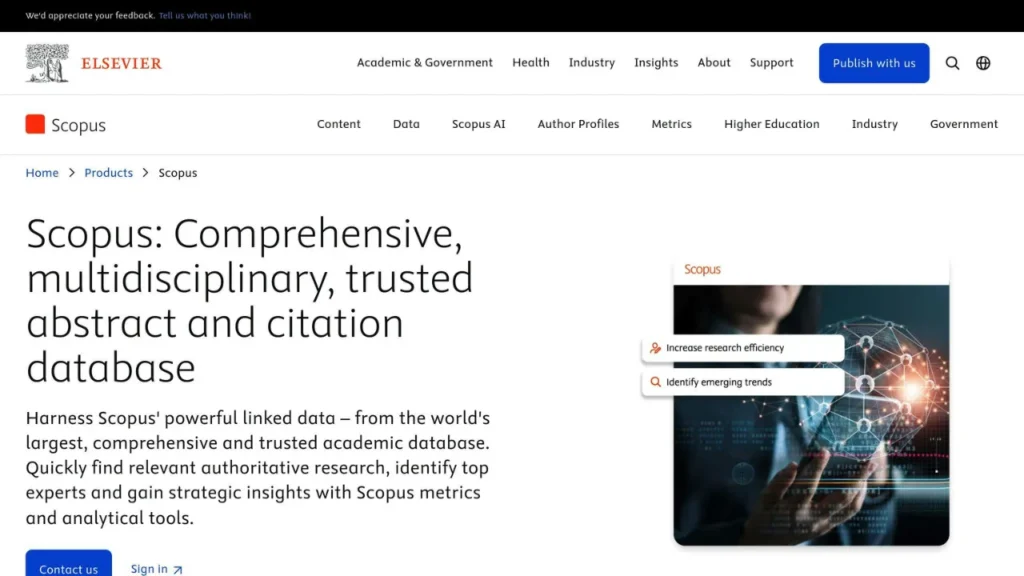
A well-known academic database that combines contemporary analytics with conventional research tools is Scopus. It contributes significantly to literature reviews by fusing traditional techniques with the effectiveness of artificial intelligence.
In 2025, Scopus is a preferred resource for scholarly research due to its extensive collection of indexed content. To assist researchers in finding pertinent studies, Scopus offers sophisticated, interdisciplinary search tools. Users can focus on important literature more easily by using its filters to narrow down results.
These resources are also excellent for identifying patterns in research and establishing links between various disciplines. An easy way to see how research changes over time is to use Scopus’ citation tracking system. Users can identify important studies and comprehend their cross-disciplinary impact with the aid of this feature.
Important applications include:
- Finding important papers in a particular field
- Recognizing how research has changed over time
- Tracking the impact of published work
One notable feature of Scopus is its capacity to arrange vast amounts of research. It assists researchers in identifying gaps in previous research and charting trends. Scopus is a good place to start for literature reviews even though it lacks integrated AI summarization tools.
Scopus is frequently used by researchers to locate and arrange sources before combining it with other tools for more in-depth content analysis. Scopus is great for database searches and citation tracking.
Iris.AI
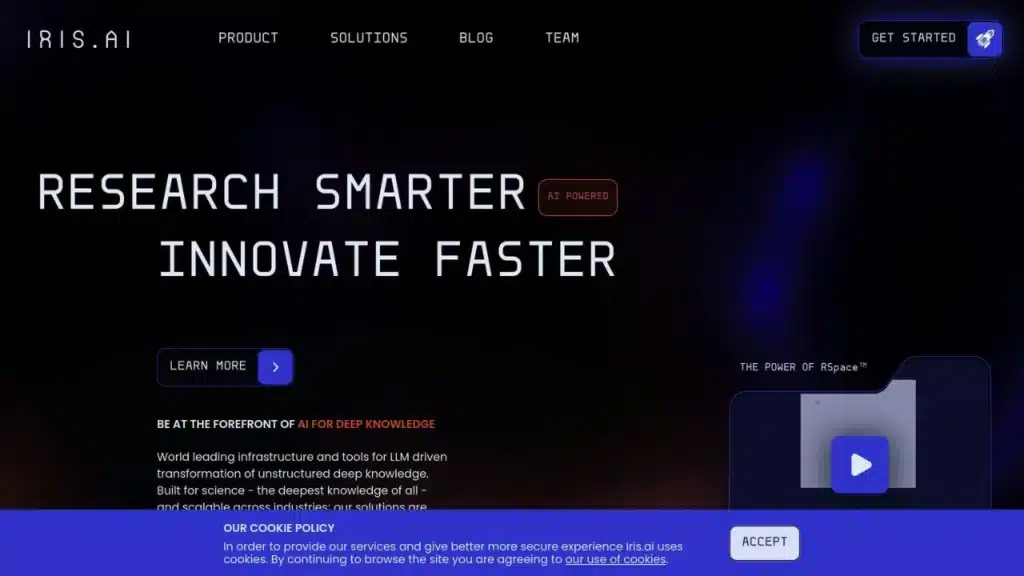
By identifying connections between research fields and providing insights into subjects that cut across several disciplines, Iris.ai leverages AI to expedite literature reviews. Iris.ai distinguishes itself in interdisciplinary research by recognizing connections across multiple fields and comprehending queries in context.
It is perfect for projects involving multiple research areas because of its intelligent search system, which bridges the gap between disciplines. Iris.ai integrates well with current citation tools, despite not managing citations directly.
Its main objective is to find and evaluate content. Iris.ai assists researchers in managing sizable collections of interdisciplinary literature through AI-driven categorization. Its automated system finds significant connections between related papers and groups them together.
Iris.ai’s summarization tools, such as content synthesis, thematic clustering, and literature mapping, increase the effectiveness of research. These tools expedite and simplify early-stage literature reviews by extracting key findings and methodologies.
Scholarcy
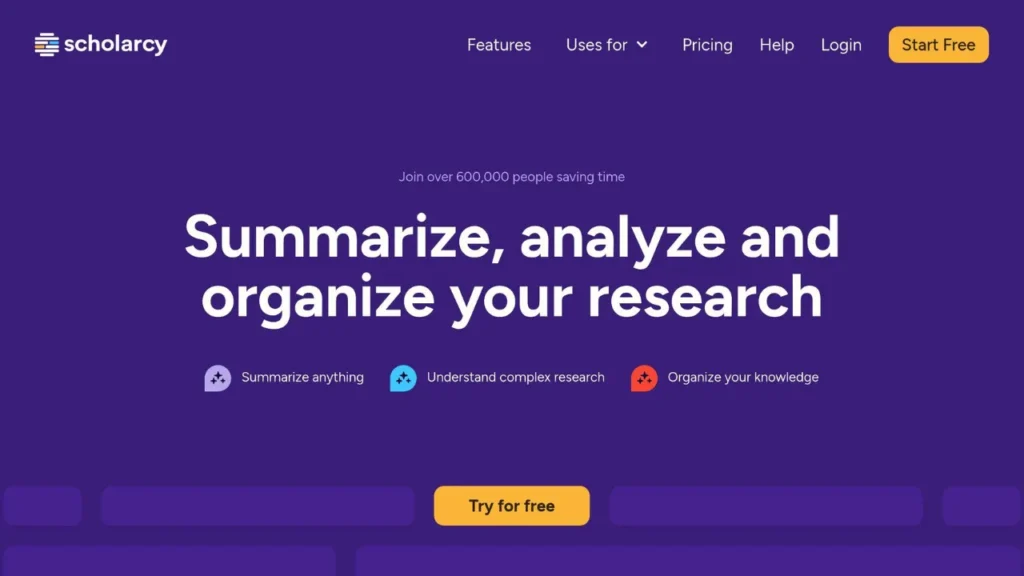
Researchers often struggle with processing large amounts of academic literature. This task is made easier by Scholarcy, which condenses complex academic papers into clear, concise summaries. Scholarcy focuses on making complex content easier to understand, as opposed to tools made for searching or mapping connections.
Scholarcy does not function as a conventional search engine. Rather, it is very good at evaluating academic papers that are uploaded or linked. It assists researchers in rapidly identifying pertinent insights without having to read the entire text by extracting important details.
Scholarcy automates the time-consuming task of manually managing citations. Scholarcy keeps researchers organized when they are working on several papers at once. For greater clarity, it systematically classifies content.
Scholarcy’s ability to produce organized summaries is what makes it unique. It simplifies difficult material by segmenting papers into sections such as methods, results, and conclusions. The tool condenses and arranges the key points, research techniques, findings, and conclusions into understandable summaries.
Conclusion: AI Tools for Literature Review
In 2025, AI tools for literature review will simplify academic research with powerful features, each with its own advantages. Researchers can overcome a number of obstacles in the literature review process by carefully using these tools.
Sourcely is an excellent option for students and researchers in their early careers because of its extensive database and automated summarization. Quick and efficient source discovery is ensured by its user-friendly search system, which is tailored for academic needs.
The emergence of tools such as Consensus demonstrates how AI can effectively compile academic consensus. This tool saves researchers a great deal of time by providing concise, summarized insights, and it is especially helpful in specialized fields. Iris.ai and Research Rabbit offer clear benefits for multidisciplinary research.
Iris.ai helps uncover connections across different fields, while Research Rabbit’s tailored recommendations reveal hidden links between studies. Collectively, they demonstrate how AI is revolutionizing network-based and interdisciplinary research.


